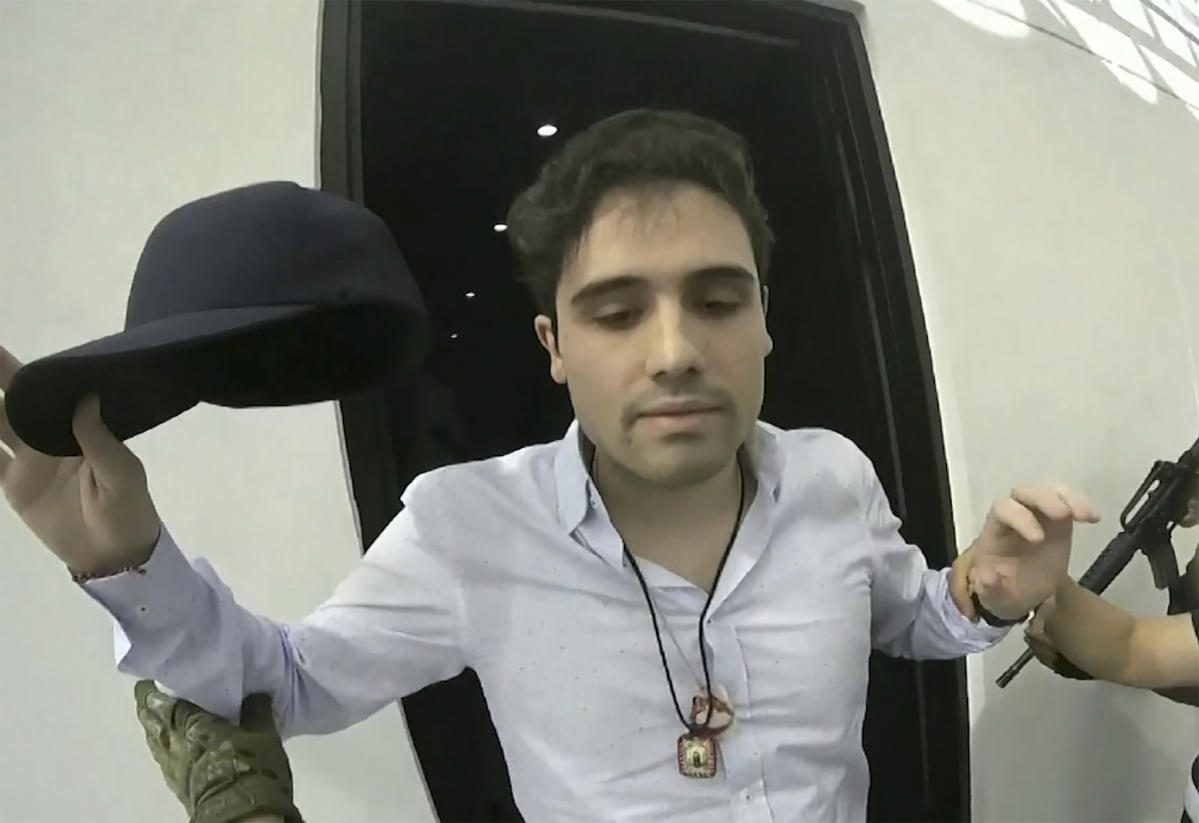Global Courant 2023-05-01 09:07:54
MEXICO CITY (AP) — Featuring the boss of the Sinaloa cartel Joaquin “El Chapo” Guzman While serving a life sentence, his sons steered the family business toward fentanyl, establishing a network of labs that produced massive amounts of the cheap, deadly drug that they smuggled into the U.S., prosecutors revealed in a recent indictment.
Although Guzmán’s trial revolved around cocaine shipments, the case against his sons reveals the inner workings of a cartel undergoing a generational change as it worked “to produce the most potent fentanyl and sell it at the lowest price in the United States,” according to the indictment opened April 14 in Manhattan.
Synthetic opioids – mainly fentanyl – now kill more Americans each year than died in the wars in Vietnam, Iraq and Afghanistan combined, fueling an argument among some politicians that the cartels should be branded as terrorist organizations and prompting a once unthinkable call for US military intervention across the border.
“The problem with fentanyl, as some people at the State Department told me, needs to be moved. It’s not a drug problem; it’s a poisoning problem,” said Alejandro Hope, a safety analyst in Mexico, who passed away on Friday. “Very few people consciously seek out fentanyl.”
The foundations for the fentanyl epidemic in the US were laid more than 20 years ago, with aggressive overprescription of the synthetic opioid oxycodone. While US authorities held on to the prescription, users turned to heroin, which the Sinaloa cartel happily supplied.
But making his own fentanyl – much more potent and versatile than heroin – in small, easily concealed labs was a game changer. The cartel went from its first makeshift fentanyl lab in less than a decade to a network of labs centered in the northern state of Sinaloa.
“These aren’t super labs, because they give people the illusion that they’re like pharmaceutical labs, you know, very sophisticated,” said Mike Vigil, former chief of international operations for the US Drug Enforcement Administration. “These are nothing more than metal tubs, and they use wooden paddles — even shovels — to mix the chemicals.”
Story continues
A single cartel “chef” can squeeze fentanyl into 100,000 counterfeit pills every day to fool Americans into thinking they are on Xanax, Percocet, or oxycodone. The pills are smuggled across the border to supply what son Iván Archivaldo Guzmán Salazar says are “streets of junkies,” the indictment said.
Fentanyl is so cheap to make that the cartel is making huge profits even by selling the drug wholesale at 50 cents a pill, prosecutors said.
The potency of the drug makes it particularly dangerous. The narcotic dose of fentanyl is so close to the lethal dose that a pill designed to give a habituated user a high can easily kill a less experienced person taking something they didn’t know was fentanyl.
Between August 2021 and August last year, more than 107,000 Americans died of drug overdoses, most of them from synthetic opioids. Last year, the DEA seized more than 57 million fentanyl-laced counterfeit pills, according to the New York indictment.
To protect and expand that business, the “Chapitos,” as the sons are called, have turned to grotesque violence.
Enforcers Ivan Archivaldo Guzmán Salazar and Jesus Alfredo Guzmán Salazar are the main defendants among the 23 employees charged in the New York indictment. Ovidio Guzmán López, aka “the mouse,” who allegedly pushed the cartel into fentanyl, is facing charges in the same district in another charge. Mexico arrested him in January and the US government has requested his extradition. Joaquín Guzmán López is being charged in the Northern District of Illinois
According to the Guzmán Salazar indictment, the cartel conducts some lab tests on its product, but conducts more gruesome human tests on kidnapped rivals or addicts who are injected until they overdose.
The purity of the cartel’s fentanyl “varies widely depending on the method and skill of the particular manufacturer,” prosecutors noted. After a user overdosed on one batch, it was shipped to the US anyway
When the elder Guzmán and Ismael “El Mayo” Zambada ran the Sinaloa Cartel, it operated with a certain amount of restraint. But with Guzmán serving a life sentence and Zambada believed to be suffering from health problems, the Chapitos moved aggressively to prevent a power vacuum that could splinter the cartel.
“What was really a unique advantage of the Sinaloa Cartel and El Chapo was the ability to calibrate force,” said Vanda Felbab-Brown, a senior fellow in the Brookings Institute’s Strobe Talbott Center for Security, Strategy, and Technology. .
The sweeping indictment in New York against the Guzmán Salazar brothers details their penchant for feeding enemies to their pet tigers and describes how they tortured two Mexican federal agents, ripping someone’s muscles with a corkscrew, then plugging the holes with chili peppers before shooting him.
The indictment also provides context for recent violence in Mexico.
In August 2022, gunmen shot down Ciudad Juarez across from El Paso, Texas. Two prisoners and nine civilians in the city were killed. US prosecutors say the Chapitos’ security division directed their local gang members to commit the violence, targeting the companies of a rival cartel.
“This isn’t their father’s Sinaloa Cartel,” Felbab-Brown said. “These guys just operate in a very different mindset than their father.”
The indictment against Guzmán Salazar makes a first attempt to disrupt the cartel’s supply chain, citing four people associated with a China-based chemical company and a broker in Guatemala who allegedly helped the cartel get the chemicals and even instructed them on the best fentanyl recipes.
“If they talk about labs and you try to focus on labs, it’s not going to have an impact unless you get the finished product or the precursor chemicals,” Vigil said.
The government of Mexico has stumbled through mixed coverage of its security forces playing up their lab dismantling, while President Andrés Manuel López Obrador has claimed fentanyl is not produced in Mexico.
Congressional testimony Thursday pressured DEA administrator Anne Milgram over whether Mexico and China are doing enough to cooperate with the US
“We want the Mexicans to work with us and we want them to do more,” Milgram said, adding that the DEA would not hesitate to crack down on public officials in Mexico or elsewhere if it found evidence of ties to the cartels.
Experts say López Obrador is an obstacle to slowing the cartels’ fentanyl production. After US prosecutors announced the joint effort against the Sinaloa cartel, López Obrador reacted angrily. The president accused US government of “espionage” and “interference”, suggesting the case was built on information gathered by U.S. agents in Mexico.
The president had already severely limited Mexico’s cooperation with the DEA, experts said.
Hope, the security analyst, said a fundamental problem is that López Obrador doesn’t seem to understand the threat posed by fentanyl. The president opposes a deterioration in family values in the United States and portrays addiction as a moral flaw.
“He’s trapped in a moral universe from 50 years ago,” Hope said.








